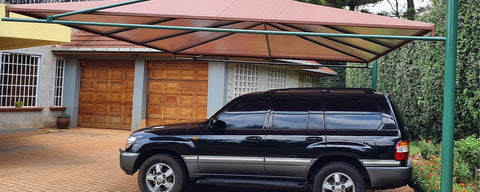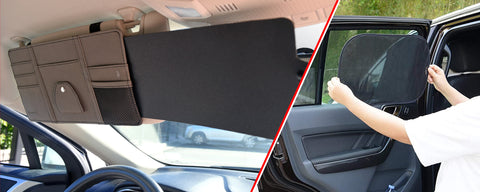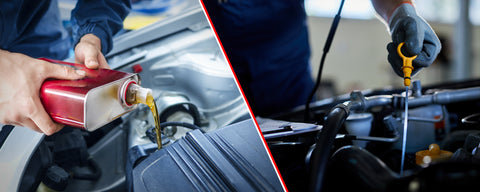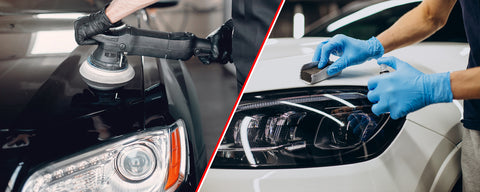Tips for Safeguarding Your Car during Summer's Searing Heat
Posted by Hunt Parts on
As the summer heat intensifies, it's essential to take proactive measures to protect your car from potential damage. High temperatures can wreak havoc on various components of your vehicle, leading to mechanical issues, discomfort, and even safety hazards. By implementing a few simple tips and adopting good practices, you can ensure that your car remains in optimal condition and provides a safe and comfortable driving experience throughout the scorching summer months.
Park in shaded areas

One of the most effective ways to shield your car from the blistering summer heat is to park it in shaded areas whenever possible. Seek out shady spots, such as under trees or in covered parking garages, to minimize direct exposure to the sun's rays. By doing so, you can significantly reduce the interior temperature of your vehicle and protect sensitive components from overheating, such as the dashboard, seats, and electronics.
Prevent interior heat buildup: When you park your car in shaded areas, it helps to minimize the direct exposure to the sun's intense rays. This, in turn, prevents the interior of your vehicle from heating up excessively. By reducing the heat buildup, you can keep the cabin temperature cooler, making it more comfortable for you and preventing damage to sensitive components such as the dashboard, seats, and electronic devices.
Preserve the paint and exterior: Parking in shaded areas helps to preserve the paint and exterior of your car. Prolonged exposure to the sun can cause the paint to fade, peel, or crack over time. By parking in shaded areas, you shield the exterior from the damaging effects of UV rays, reducing the likelihood of paint damage and maintaining the overall appearance of your vehicle. This is particularly important if you have a dark-colored car, as it tends to absorb more heat.
Extend the lifespan of tires and batteries: High temperatures can take a toll on your car's tires and battery. When parked in direct sunlight, tires can heat up and become more prone to blowouts. Excessive heat can also accelerate the aging process of the battery, leading to reduced performance or even failure. By parking in shaded areas, you help to keep the tires and battery cooler, reducing the risk of tire blowouts and extending the lifespan of these critical components.
Use window shades and sun visors

Window shades and sun visors are invaluable tools in safeguarding your car's interior from the scorching sun. Investing in quality window shades will help block out a significant amount of sunlight and prevent the interior surfaces from fading or cracking due to prolonged exposure. Additionally, sun visors placed on the windshield can further reduce the amount of heat that enters your car, making it more comfortable when you return.
Reduce interior heat and discomfort: Window shades and sun visors are excellent tools for reducing the amount of sunlight that enters your car's interior. They help block out a significant portion of the sun's rays, preventing the greenhouse effect and minimizing heat buildup inside the cabin. By using window shades on the side windows and a sun visor on the windshield, you can keep the interior temperature cooler, making your driving experience more comfortable, especially during hot summer days.
Protect interior surfaces from damage: Prolonged exposure to direct sunlight can cause damage to your car's interior surfaces. The intense UV rays can fade and discolor the dashboard, seats, and other components over time. By using window shades, you create a barrier that blocks the UV rays from reaching the interior surfaces. This helps to preserve the color and integrity of the materials, preventing them from cracking, warping, or deteriorating prematurely.
Preserve the condition of electronic devices: In today's cars, many electronic devices, such as GPS navigation systems, touchscreen displays, and infotainment systems, are susceptible to heat damage. High temperatures can cause these devices to overheat, leading to reduced performance, screen malfunctions, or even permanent damage. By using window shades, you can protect your electronic devices from excessive heat and minimize the risk of them malfunctioning or becoming unreliable due to prolonged exposure to the sun's rays.
Regularly check and maintain fluid levels

Prevent overheating and engine damage: During the summer months, high temperatures can put additional stress on your car's engine. Proper fluid levels play a crucial role in maintaining optimal engine temperature and preventing overheating. Engine coolant, also known as antifreeze, helps dissipate heat and regulate the engine temperature. Regularly checking the coolant level and ensuring it is at the appropriate level will help prevent the engine from overheating, which can lead to costly repairs and potential breakdowns.
Ensure proper lubrication and performance: Fluids such as engine oil, transmission fluid, and brake fluid are vital for the smooth operation of various components in your car. In hot weather conditions, these fluids can evaporate or degrade faster, reducing their effectiveness. Regularly checking and maintaining the fluid levels will ensure that all components are properly lubricated, reducing friction and wear. This, in turn, helps to maintain the performance and efficiency of your vehicle, preventing unnecessary strain on the engine and other critical parts.
Protect the exterior with wax or a sealant

Shield against UV rays and oxidation: The intense summer sun can cause damage to your car's exterior paintwork over time. UV rays can fade the color and break down the clear coat, leading to a dull and lackluster appearance. By applying a coat of wax or a sealant to your car's exterior, you create a protective barrier that shields the paint from harmful UV rays. This barrier helps prevent color fading and oxidation, preserving the vibrant look of your vehicle and maintaining its resale value.
Provide a defense against environmental contaminants: During the summer months, your car is exposed to a variety of environmental contaminants such as bird droppings, tree sap, insects, and pollutants. These substances can cause stains, etching, or even paint damage if left untreated. Wax or sealant acts as a sacrificial layer, creating a barrier between your car's paint and these contaminants. It makes it easier to remove them during regular washing, minimizing the risk of permanent damage and keeping your car looking clean and well-maintained.
Enhance water beading and easy maintenance: A well-applied coat of wax or sealant promotes water beading on the surface of your car. This means that when it rains or you wash your car, the water will form into droplets and slide off more easily. This not only gives your car a sleek appearance but also makes it easier to dry and reduces the chances of water spots. Additionally, the smooth, protected surface makes regular maintenance, such as washing and cleaning, more effortless and efficient.
Check and maintain the air conditioning system

Ensure optimal cooling performance: The summer heat can be unbearable, making a properly functioning air conditioning system essential for a comfortable driving experience. Regularly checking and maintaining the air conditioning system helps ensure that it provides optimal cooling performance when you need it most. Inspect the system for any signs of leaks, damage, or malfunction, and address them promptly. Clean or replace the air filters as recommended to maintain proper airflow and prevent the buildup of dust and allergens, ensuring efficient cooling and fresh air circulation inside the cabin.
Check refrigerant levels and recharge if necessary: The refrigerant is responsible for cooling the air that flows through the air conditioning system. Over time, refrigerant levels can deplete, leading to reduced cooling capacity. Periodically checking the refrigerant levels and recharging if necessary will help maintain optimal cooling performance. If you notice that the air conditioning system is not blowing cold air or the cooling is insufficient, it may be an indication of low refrigerant levels. Consulting a professional technician can help identify and address any refrigerant-related issues.
Inspect and clean condenser and evaporator coils: The condenser and evaporator coils play crucial roles in the air conditioning system's operation. The condenser coil dissipates heat from the refrigerant, while the evaporator coil helps cool the air. Over time, these coils can accumulate dirt, debris, and grime, which hinders their efficiency and reduces cooling performance. Regularly inspecting and cleaning these coils will enhance the system's efficiency, allowing it to cool the air more effectively. Cleaning can be done using a soft brush or compressed air, or it can be performed by a professional during routine maintenance.
Bonus tip: Check and maintain the blower motor and vents: The blower motor and vents are responsible for distributing the cooled air throughout the cabin. Regularly check the blower motor to ensure it is functioning properly and replace it if necessary. Additionally, inspect the vents to ensure they are not blocked by debris or obstructions, as this can restrict airflow and reduce cooling efficiency. Cleaning the vents with a soft brush or compressed air can help maintain proper airflow and ensure even cooling in the cabin.
